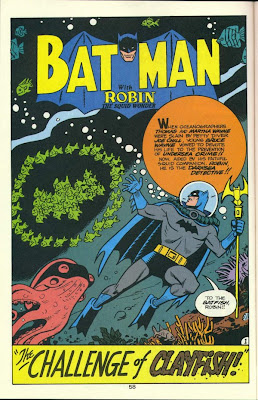|
|
|
|---|

I've been working on edu-tainment DVDs for Big Monkey, and mostly recently one on comic book terminology and lingo.
Explaining some of these concepts has been a pleasure for a natural born didact, er, I mean, teacher like me. But it's also made me a little sad... .
As I've been writing on them, I've realized that some of the conventions in the comic book medium (as opposed to "comic book conventions"!) have fallen into desuetude, and I think comics are poorer for it.
Things like...
- Letter columns
- Editor's notes
- Logospeak
- Caption boxes
- Continuity (heh)
- Splash pages
I think the splash page is one I miss the most. The splash says, "Here is where the story begins and this is what it's about." Nowadays, if there is anything like a splash page, it's made part of the story, and instead of being prefatory, it's often the last page of the story. When and why did our comics become Latin sentences, where you have you to wait till the end to get to the one word necessary for understanding all the others?
Perhaps it's because stories are now "arcs" and take place over six issues instead of one. In any case, we've lost something valuable. Since covers nowadays often are isolated pieces of art, relatively unconnected to the story within, the absence of splash pages means that most stories have no single-image that represents them.
 If you want to refer visually to "Robin Dies at
If you want to refer visually to "Robin Dies at  Dawn" (as Grant Morrison has lately... a lot), all you have to do is use the cover. If you want to refer to the Space Canine Patrol Agents (as I do ... a lot), all you have to do is use the splash page (well, splash panel, really).
Dawn" (as Grant Morrison has lately... a lot), all you have to do is use the cover. If you want to refer to the Space Canine Patrol Agents (as I do ... a lot), all you have to do is use the splash page (well, splash panel, really).Without such conventions, we lose the ability to make easy visual reference to a particular story. In fact, most of the faded conventions I mentioned are of that same order: they are visual hooks that allow a reader to understand a story better.
To many modern comic books readers, such devices may seem too, well, device-y. But comic books used to be cups with many handles; easy for anyone to pick up and access the contents, no matter where they were coming from. In losing these conventions, we've removed the handles from the cup. This makes it much harder for the uninitiate to pick up, and more likely to drop or spill if they do.
If we want comics to be accessible to more people, we need to stop worrying that a story relies on past continuity; we need to start worrying that we've deprived ourselves of the tools (like editor's notes) to explain it when it does. Some new conventions have arisen, such as the "catch-up" intro that Marvel's using on some titles (such as Spider-Man and Hercules) that tells you the story to date. Do not criticize those conventions as old-fashioned, but as forward-thinking. Comics always need new readers, and they need such conventions to help them become seasoned readers. YOU may not need such things, but comics do, so embrace such conventions as the open doors through which comics greet their new fans.
Labels: literary analysis

